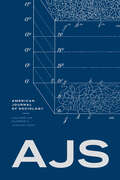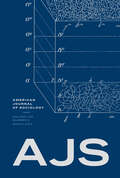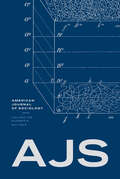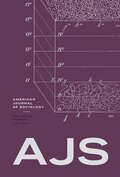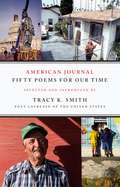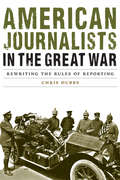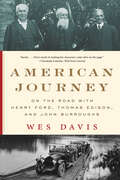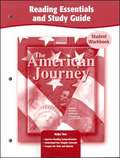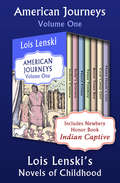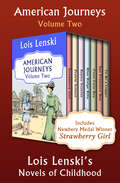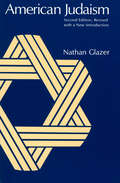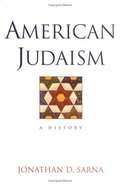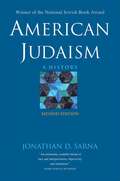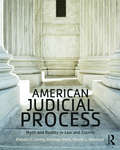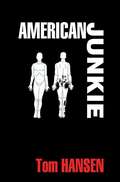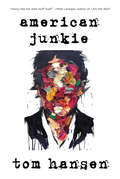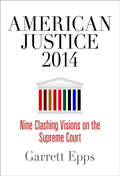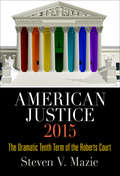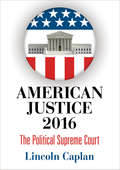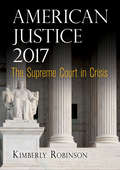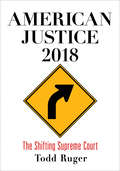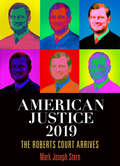- Table View
- List View
American Journal of Sociology, volume 130 number 4 (January 2025)
by American Journal of SociologyThis is volume 130 issue 4 of American Journal of Sociology. American Journal of Sociology (AJS) presents pathbreaking work from all areas of sociology, with an emphasis on theory building and innovative methods. AJS strives to speak to the general sociology reader and is open to contributions from across the social sciences—sociology, political science, economics, history, anthropology, and statistics—that seriously engage the sociological literature to forge new ways of understanding the social. AJS offers a substantial book review section that identifies the most salient work of both emerging and enduring scholars of social science. Commissioned review essays appear occasionally, offering readers a comparative, in-depth examination of prominent titles.
American Journal of Sociology, volume 130 number 5 (March 2025)
by American Journal of SociologyThis is volume 130 issue 5 of American Journal of Sociology. American Journal of Sociology (AJS) presents pathbreaking work from all areas of sociology, with an emphasis on theory building and innovative methods. AJS strives to speak to the general sociology reader and is open to contributions from across the social sciences—sociology, political science, economics, history, anthropology, and statistics—that seriously engage the sociological literature to forge new ways of understanding the social. AJS offers a substantial book review section that identifies the most salient work of both emerging and enduring scholars of social science. Commissioned review essays appear occasionally, offering readers a comparative, in-depth examination of prominent titles.
American Journal of Sociology, volume 130 number 6 (May 2025)
by American Journal of SociologyThis is volume 130 issue 6 of American Journal of Sociology. American Journal of Sociology (AJS) presents pathbreaking work from all areas of sociology, with an emphasis on theory building and innovative methods. AJS strives to speak to the general sociology reader and is open to contributions from across the social sciences—sociology, political science, economics, history, anthropology, and statistics—that seriously engage the sociological literature to forge new ways of understanding the social. AJS offers a substantial book review section that identifies the most salient work of both emerging and enduring scholars of social science. Commissioned review essays appear occasionally, offering readers a comparative, in-depth examination of prominent titles.
American Journal of Sociology, volume 131 number 1 (July 2025)
by American Journal of SociologyThis is volume 131 issue 1 of American Journal of Sociology. American Journal of Sociology (AJS) presents pathbreaking work from all areas of sociology, with an emphasis on theory building and innovative methods. AJS strives to speak to the general sociology reader and is open to contributions from across the social sciences—sociology, political science, economics, history, anthropology, and statistics—that seriously engage the sociological literature to forge new ways of understanding the social. AJS offers a substantial book review section that identifies the most salient work of both emerging and enduring scholars of social science. Commissioned review essays appear occasionally, offering readers a comparative, in-depth examination of prominent titles.
American Journal: Fifty Poems for Our Time
by Tracy K. SmithA landmark anthology envisioned by Tracy K. Smith, 22nd Poet Laureate of the United StatesAmerican Journal presents fifty contemporary poems that explore and celebrate our country and our lives. 22nd Poet Laureate of the United States and Pulitzer Prize winner Tracy K. Smith has gathered a remarkable chorus of voices that ring up and down the registers of American poetry. In the elegant arrangement of this anthology, we hear stories from rural communities and urban centers, laments of loss in war and in grief, experiences of immigrants, outcries at injustices, and poems that honor elders, evoke history, and praise our efforts to see and understand one another. Taking its title from a poem by Robert Hayden, the first African American appointed as Consultant in Poetry to the Library of Congress, American Journal investigates our time with curiosity, wonder, and compassion. Among the fifty poets included are: Jericho Brown, Natalie Diaz, Matthew Dickman, Mark Doty, Ross Gay, Aracelis Girmay, Joy Harjo, Terrance Hayes, Cathy Park Hong, Marie Howe, Major Jackson, Ilya Kaminsky, Robin Coste Lewis, Ada Límon, Layli Long Soldier, Erika L. Sánchez, Solmaz Sharif, Danez Smith, Susan Stewart, Mary Szybist, Natasha Trethewey, Brian Turner, Charles Wright, and Kevin Young.
American Journal: The Events of 1976
by Elizabeth DrewIn 1976 Elizabeth Drew decided to keep a journal of the events of that crucial year. Among the reasons for the journal was that the country would be electing a President against the background of a particularly large number of questions, national and international, that were unresolved. What sets American Journal apart from other books is Ms. Drews focus on those enormous and complex issues that, regardless of who became or Chief Executive, will be with us for years to come: arms control and nuclear proliferation, energy policy, the economy, unemployment and inflation, among others. Through incisive interviews, dogged research, a thorough knowledge of the agencies and branches of the government and their checks and balances, plain common sense, and, above all, an almost uncanny ability to predict future events and trends, Ms. Drew delineates the perimeters of these issues, and helps her readers to foresee how they may be decided.
American Journalists in the Great War: Rewriting the Rules of Reporting (Studies in War, Society, and the Military)
by Chris DubbsWhen war erupted in Europe in 1914, American journalists hurried across the Atlantic ready to cover it the same way they had covered so many other wars. However, very little about this war was like any other. Its scale, brutality, and duration forced journalists to write their own rules for reporting and keeping the American public informed.American Journalists in the Great War tells the dramatic stories of the journalists who covered World War I for the American public. Chris Dubbs draws on personal accounts from contemporary newspaper and magazine articles and books to convey the experiences of the journalists of World War I, from the western front to the Balkans to the Paris Peace Conference. Their accounts reveal the challenges of finding the war news, transmitting a story, and getting it past the censors. Over the course of the war, reporters found that getting their scoop increasingly meant breaking the rules or redefining the very meaning of war news. Dubbs shares the courageous, harrowing, and sometimes humorous stories of the American reporters who risked their lives in war zones to record their experiences and send the news to the people back home.
American Journals
by Albert Camus Hugh Levick Roger GuilliotFurnishing tidbits for Camus scholars, providing his take on North and South America, notably New York City and cities of Brazil, along with Buenos Aires and Santiago, Camus seems to have met only a few people he liked, and maybe two or three sites impressed him. He reflects on suicide. No it is not a cheerful work, but it is vivid. For Americans, this work if valuable for he describes our homeland.
American Journey Since 1865
by James West DavidsonA textbook on American history, American Journey helps the reader understand the link between the past and present.
American Journey: On The Road With Henry Ford, Thomas Edison, And John Burroughs
by Wes Davis“Jaunty.… Davis excels in making his characters come alive on the page.” —Christoph Irmscher, Wall Street Journal The epic road trips—and surprising friendship—of John Burroughs, nineteenth-century naturalist, and Henry Ford and Thomas Edison, inventors of the modern age. In 1913, an unlikely friendship blossomed between Henry Ford and famed naturalist John Burroughs. When their mutual interest in Ralph Waldo Emerson led them to set out in one of Ford’s Model Ts to explore the Transcendentalist’s New England, the trip would prove to be the first of many excursions that would take Ford and Burroughs, together with an enthusiastic Thomas Edison, across America. Their road trips—increasingly ambitious in scope—transported members of the group to the 1915 Panama–Pacific International Exposition in San Francisco, the Adirondacks of New York, and the Green Mountains of Vermont, finally paving the way for a grand 1918 expedition through southern Appalachia. In many ways, their timing could not have been worse. With war raging in Europe and an influenza pandemic that had already claimed thousands of lives abroad beginning to plague the United States, it was an inopportune moment for travel. Nevertheless, each of the men who embarked on the 1918 journey would subsequently point to it as the most memorable vacation of their lives. These travels profoundly influenced the way Ford, Edison, and Burroughs viewed the world, nudging their work in new directions through a transformative decade in American history. In American Journey, Wes Davis re-creates these landmark adventures, through which one of the great naturalists of the nineteenth century helped the men who invented the modern age reconnect with the natural world—and reimagine the world they were creating.
American Journey: Reading Essentials and Study Guide
by Mcgraw-Hill StaffStudy guide accompanying the high school history textbook.
American Journeys Volume One: Lois Lenski's Novels of Childhood (American Journeys #1)
by Lois LenskiFrom a Newbery Award–winning author: Seven beloved classics that beautifully capture growing up and overcoming challenges across America. In her Newbery Honor Book, Indian Captive, and her Regional America series, six of which are collected here, author/illustrator Lois Lenski presents realistic portrayals of unforgettable young people facing hardships in a range of areas across the country. Based on a true story, Indian Captive tells the compelling chronicle of a twelve-year-old girl kidnapped by the Shawnee in 1758 Pennsylvania. Beginning with the Children’s Book Award winner Judy’s Journey, Lenski depicted kids’ experiences in different regions of mid-twentieth-century America—from East Coast migrant workers to a Texas girl whose family is dealing with drought, from an eleven-year-old boy in oil-boom Oklahoma to the daughter of coal miners in West Virginia, from a family in a flooded western Connecticut town to an African American girl in the 1950s coping with moving north with the help of her loving grandmother. Beyond changing the face of children’s literature, Lenski’s stories continue to endure because of their moving and believable depictions of young people from often overlooked communities. Through her art, Lenski gave these characters a voice that still rings loud and clear for modern readers. This ebook includes Indian Captive, Judy’s Journey, Flood Friday, Texas Tomboy, Boom Town Boy, Coal Camp Girl, and Mama Hattie’s Girl.
American Journeys Volume Two: Lois Lenski's Novels of Childhood (American Journeys #2)
by Lois LenskiFrom a Newbery Award–winning author: These seven beloved classics beautifully capture growing up and overcoming challenges across America. In her Regional America series, author and illustrator Lois Lenski presents realistic portrayals of unforgettable young people facing hardships and triumphs across the diverse United States. The Newbery Medal–winning Strawberry Girl follows day-to-day life for Birdie and her family on a berry farm in Florida, as they deal with heat, droughts, cold snaps, and difficult neighbors. In Prairie School, a young girl gets stranded at her South Dakota school by a winter storm; in Bayou Suzette, the Cajun Suzette strikes up an unlikely friendship with a Native American girl in the swamps of Louisiana; and Blue Ridge Billy is the story of a boy who dreams of playing the fiddle. Other novels follow the lives of a young farmer who wants to quit school and work on his family&’s Iowa farm; an Asian-American boy adjusting to city life in San Francisco&’s Chinatown; and an adolescent lumberjack in the forests of Oregon. Beyond changing the face of children&’s literature, Lenski&’s stories endure because of their moving and believable depictions of young people from often overlooked communities. Through her art, Lenski gives these characters a voice that continues to ring loud and clear for modern readers. This ebook includes Strawberry Girl, Prairie School, Bayou Suzette, Blue Ridge Billy, Corn-Farm Boy, San Francisco Boy, and To Be a Logger.
American Judaism (The Chicago History of American Civilization)
by Nathan GlazerFirst published in 1957, Nathan Glazer's classic, historical study of Judaism in America has been described by the New York Times Book Review as "a remarkable story . . . told briefly and clearly by an objective historical mind, yet with a fine combination of sociological insight and religious sensitivity." Glazer's new introduction describes the drift away from the popular equation of American Judaism with liberalism during the last two decades and considers the threat of divisiveness within American Judaism. Glazer also discusses tensions between American Judaism and Israel as a result of a revivified Orthodoxy and the disillusionment with liberalism. "American Judaism has been arguably the best known and most used introduction to the study of the Jewish religion in the United States. . . . It is an inordinately clear-sighted work that can be read with much profit to this day."—American Jewish History (1987)
American Judaism: A History
by Jonathan D. SarnaSarna, a preeminent scholar of American Judaism (he's affiliated with Brandeis University), chronicles events, personalities, and attitudes pertaining to Jews, as well as attitudes held by Jews themselves, in the United States over a period of 350 years. He weaves the history of a people present in the United States since early colonial daysmarginalized in many ways and always worried about survivalinto the context of America's political, social, and religious life. Relevant to non-Jewish as well as Jewish communities, the themes of evolving cultural and personal identities, assimilation, and revitalization are core in both American history and contemporary American life. This thoughtful and engaging work will attract a wide scholarly and lay audience. Annotation ©2004 Book News, Inc. , Portland, OR (booknews. com)
American Judaism: A History, Second Edition
by Jonathan D. SarnaJonathan D. Sarna’s award-winning American Judaism is now available in an updated and revised edition that summarizes recent scholarship and takes into account important historical, cultural, and political developments in American Judaism over the past fifteen years. Praise for the first edition: “Sarna . . . has written the first systematic, comprehensive, and coherent history of Judaism in America; one so well executed, it is likely to set the standard for the next fifty years.”—Jacob Neusner, Jerusalem Post “A masterful overview.”—Jeffrey S. Gurock, American Historical Review “This book is destined to be the new classic of American Jewish history.”—Norman H. Finkelstein, Jewish Book World Winner of the 2004 National Jewish Book Award/Jewish Book of the Year
American Judicial Process: Myth and Reality in Law and Courts
by Artemus Ward Pamela C. Corley Wendy L. MartinekThis text is a general introduction to American judicial process. The authors cover the major institutions, actors, and processes that comprise the U.S. legal system, viewed from a political science perspective. Grounding their presentation in empirical social science terms, the authors identify popular myths about the structure and processes of American law and courts and then contrast those myths with what really takes place. Three unique elements of this "myth versus reality" framework are incorporated into each of the topical chapters: 1) "Myth versus Reality" boxes that lay out the topics each chapter covers, using the myths about each topic contrasted with the corresponding realities. 2) "Pop Culture" boxes that provide students with popular examples from film, television, and music that tie-in to chapter topics and engage student interest. 3) "How Do We Know?" boxes that discuss the methods of social scientific inquiry and debunk common myths about the judiciary and legal system. Unlike other textbooks, American Judicial Process emphasizes how pop culture portrays—and often distorts—the judicial process and how social science research is brought to bear to provide an accurate picture of law and courts. In addition, a rich companion website will include PowerPoint lectures, suggested topics for papers and projects, a test bank of objective questions for use by instructors, and downloadable artwork from the book. Students will have access to annotated web links and videos, flash cards of key terms, and a glossary.
American Junkie
by Tom HansenIn American Junkie, Tom Hansen takes us on a non-stop into a land of desperate addicts, failed punk bands, and brushes with sad fame selling drugs during the Seattle grunge years. It's a story that takes us from the promise of a young life to the prison of a mattress, from budding musician to broken down junkie, drowning in syringes and cigarette butts, shooting heroin into wounds the size of softballs, and ultimately, a ride to a hospital for a six-month stay and a painful self-discovery that cuts down to the bone. Through it all he never really loses his step, never lets go of his smarts, and always projects quintessential American reason, humor, and hope to make a story not only about drugs, but a compelling study of vulnerability and toughness.
American Junkie
by Tom HansenA non-stop trip into one man's land of desperate addicts, failed punk bands, and brushes with sad fame, as he sells drugs during the Seattle grunge years. In American Junkie, Tom Hansen maps his heroin addiction, from the promise of a young life to the prison of a mattress, from budding musician to broken down junkie, drowning in syringes and cigarette butts, shooting heroin into wounds the size of softballs, and ultimately, a ride to a hospital for a six-month stay and a painful self-discovery that cuts down to the bone. Through it all he never really loses his step, never lets go of his smarts, and always projects quintessential American reason, humor, and hope to make a story not only about drugs, but a compelling study of vulnerability and toughness.
American Justice 2014
by Garrett EppsIn this provocative and insightful digital book, constitutional scholar, novelist, and journalist Garrett Epps examines the recently concluded Supreme Court term, highlighting one revealing opinion or dissent from each Justice. The result is a highly original exploration of the issues before the court as well as an investigation of the Justices as human beings and legal thinkers.
American Justice 2015
by Steven V. MazieAmerican Justice 2015: The Dramatic Tenth Term of the Roberts Court is the indispensable guide to the most controversial and divisive cases decided by the Supreme Court during the past year. Steven Mazie, Supreme Court correspondent for The Economist, examines the term's fourteen most important cases, tracing the main threads of contention and analyzing the expected impacts of the decisions on the lives of Americans. Legal experts and law students will be drawn to the lively summaries of the issues and arguments, while scholars and theorists will be engaged and provoked by the book's elegant introduction, in which Mazie invokes John Rawls's theory of "public reason" to defend the institution of the Supreme Court against its many critics.Mazie contends that the Court is less ideologically divided than most observers presume, issuing many more unanimous rulings than 5-4 decisions throughout the term that concluded in June 2015. When ruling on questions ranging from marriage equality to freedom of speech to the Affordable Care Act, the justices often showed a willingness to depart from their ideological fellow travelers--and this was particularly true of the conservative justices. Chief Justice Roberts joined his liberal colleagues in saving Obamacare and upholding restrictions on personal solicitation of campaign funds by judicial candidates. Justice Samuel Alito and the chief voted with the liberals to expand the rights of pregnant women in the workplace. And Justice Clarence Thomas floated to the left wing of the bench in permitting Texas to refuse to print a specialty license plate emblazoned with a Confederate flag. American Justice 2015 conveys, in clear, accessible terms, the arguments, decisions, and drama in these cases, as well as in cases involving Internet threats, unorthodox police stops, death-penalty drugs, racial equality, voting rights, and the separation of powers.
American Justice 2016: The Political Supreme Court
by Lincoln CaplanWhen the Democrat-appointed Justice Ruth Bader Ginsburg criticized Republican presidential nominee Donald Trump, she triggered concerns about judicial ethics. But the political concerns were even more serious. The Supreme Court is supposed to be what Alexander Hamilton called "the least dangerous" branch of government, because it is the least political. Justices have lifetime appointments to ensure their "complete independence" when deciding cases and controversies. But in the Roberts Court's most contested and important rulings, it has divided along partisan lines for the first time in American history: Republican presidents appointed the conservatives, Democrats appointed the liberals. Justice Ginsburg's criticisms suggested that partisan politics drive the Court's most profound disagreements. Well-respected political science supports that view.Has this partisan turn made the Court less independent and less trustworthy than the nation requires? The term ending in 2016 included more decisions and developments in almost fifty years for analyzing this question. Among them were major cases about abortion rights, the death penalty, immigration, and other wedge issues, as well as the death of Justice Antonin G. Scalia, leaving the Court evenly divided between conservatives and liberals. Legal journalist Lincoln Caplan dissects the recent term, puts it in historical context, and recommends ways to strengthen trust in the Supreme Court as the pinnacle of the American constitutional system.
American Justice 2017: The Supreme Court in Crisis
by Kimberly RobinsonWith the death of associate justice Antonin Scalia, the Supreme Court was plunged into crisis. Refusing to hold hearings or confirm the nominee of a Democratic president almost a year away from a presidential election, the Republican-controlled Senate held the court hostage, forcing it to do its work through nearly the entire term ending in June 2017 with just eight justices. In American Justice 2017: The Supreme Court in Crisis, Kimberly Robinson examines the way individual justices and the institution as a whole reacted to this unprecedented, politically fraught situation.In public, the justices put on brave faces, waiting for the confirmation battle to play itself out, while indicating in occasional statements that the court would muddle through just fine. In private, though, things appear to have been more complicated. Narrow decisions, lackluster choice of cases, and odd bedfellows teaming up on the same sides of opinions and dissents give us a hint of the strenuous effort the eight justices made to uphold the integrity of the institution in the face of hurricane-force partisan gales.
American Justice 2018: The Shifting Supreme Court
by Todd RugerAfter a restrained 2017 term in which the Supreme Court muddled through most of its work with just eight justices, the court roared back to life with a momentous term in 2018. With Donald Trump's first appointment to the bench, conservative Justice Neil Gorsuch, finding his footing and swing-vote Justice Anthony Kennedy preparing for retirement at the close of the term, the Court took on a series of cases that touched on some of the most contentious issues in contemporary American life—and in almost every case gave Americans a glimpse of where the court is likely to keep shifting over the coming years: further to the right.In American Justice 2018, journalist Todd Ruger examines the most monumental of these controversial decisions—including those involving religious freedom and minority rights, partisan gerrymandering, President Trump's travel ban, privacy in the digital era, sales tax for online retailers, and apparent tensions between the First Amendment and the collection of union dues. Ruger deftly analyzes how each of these decisions fits into the history of the court—and what the opinions and dissents reveal about the shifting ideological configuration of the institution. Along the way, Ruger reflects on how the term's polarizing docket will shape the future of the Supreme Court and the legacy of individual justices.
American Justice 2019: The Roberts Court Arrives
by Mark Joseph SternFollowing the retirement of Justice Anthony Kennedy and the controversial confirmation of Justice Brett Kavanaugh, the Supreme Court plunged into a contentious term that featured divisive cases involving abortion, immigration, capital punishment, and voting rights on the court's docket. In American Justice 2019, Mark Joseph Stern examines the term's most controversial opinions and highlights the consequences of Chief Justice John Roberts stepping into a new role as the court's swing vote.No longer bound by Kennedy's erratic moderation, Roberts has begun doling out victories to both Democrats and Republicans, albeit with a clear rightward tilt. Early in the term, Roberts delivered a public rebuke to Trump's attacks on the judiciary, foreshadowing his refusal to tolerate some of the president's most extreme contortions of the law. Stern tracks the chief justice's evolution from staunch conservative to part-time centrist. Along the way, he details the term's blockbusters and surprises, including an unlikely alliance between Justices Neil Gorsuch and Sonia Sotomayor on criminal justice, and an especially radical ruling on the death penalty that overturned decades of precedent. Stern's account depicts a court sharply divided over its role in American democracy, with the man at its center striving to stay above the political fray without abandoning his conservative instincts.
